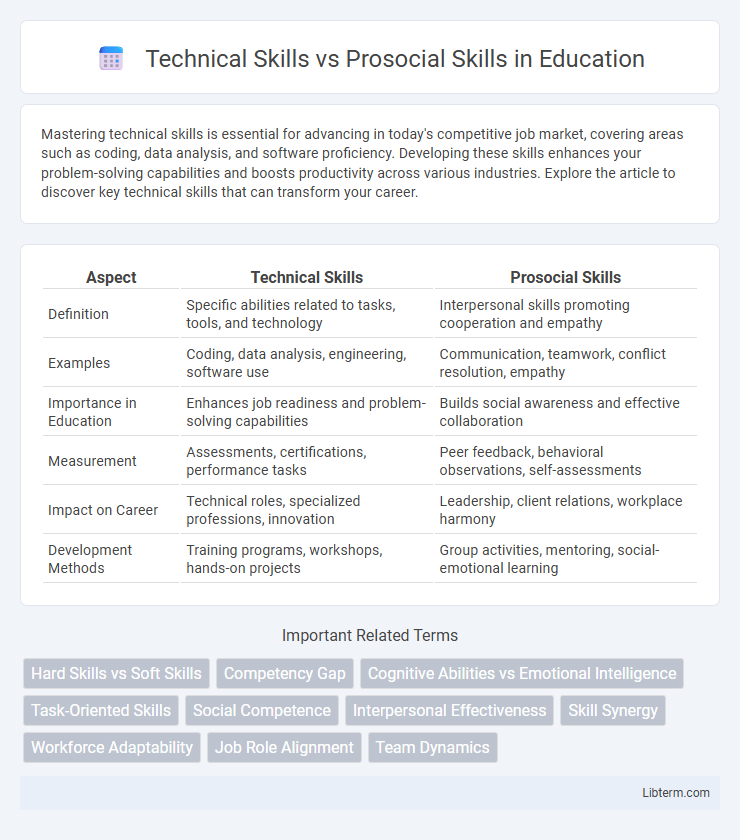Mastering technical skills is essential for advancing in today's competitive job market, covering areas such as coding, data analysis, and software proficiency. Developing these skills enhances your problem-solving capabilities and boosts productivity across various industries. Explore the article to discover key technical skills that can transform your career.
Table of Comparison
| Aspect | Technical Skills | Prosocial Skills |
|---|---|---|
| Definition | Specific abilities related to tasks, tools, and technology | Interpersonal skills promoting cooperation and empathy |
| Examples | Coding, data analysis, engineering, software use | Communication, teamwork, conflict resolution, empathy |
| Importance in Education | Enhances job readiness and problem-solving capabilities | Builds social awareness and effective collaboration |
| Measurement | Assessments, certifications, performance tasks | Peer feedback, behavioral observations, self-assessments |
| Impact on Career | Technical roles, specialized professions, innovation | Leadership, client relations, workplace harmony |
| Development Methods | Training programs, workshops, hands-on projects | Group activities, mentoring, social-emotional learning |
Understanding Technical Skills
Technical skills encompass specific knowledge and expertise required to perform particular tasks, such as programming, data analysis, or engineering design. Mastery of these skills involves continuous learning and application of industry-standard tools, software, and methodologies to solve complex problems effectively. Understanding technical skills enhances productivity and innovation by enabling precise execution and adaptation to evolving technological demands.
Defining Prosocial Skills
Prosocial skills encompass behaviors that promote positive social interactions, such as empathy, cooperation, and effective communication. Unlike technical skills, which involve specialized knowledge and task-specific expertise, prosocial skills facilitate teamwork, conflict resolution, and emotional intelligence. These interpersonal competencies are crucial for building strong relationships and fostering collaborative environments in both personal and professional settings.
Key Differences Between Technical and Prosocial Skills
Technical skills encompass specific knowledge and abilities related to tasks such as programming, data analysis, or machinery operation, emphasizing expertise and problem-solving within a specialized domain. Prosocial skills involve interpersonal abilities like communication, empathy, teamwork, and conflict resolution, essential for fostering collaboration and positive social interactions. The key differences lie in their application: technical skills drive task completion and operational efficiency, while prosocial skills enhance social cohesion and facilitate effective group dynamics.
Importance of Technical Skills in the Workplace
Technical skills are essential in the workplace as they enable employees to efficiently perform job-specific tasks, utilize industry software, and operate specialized machinery. Mastery of technical skills directly impacts productivity, quality of work, and the ability to innovate within roles requiring expertise in fields such as information technology, engineering, or data analysis. Employers prioritize technical competencies to ensure employees can meet operational demands and contribute to achieving organizational goals effectively.
The Value of Prosocial Skills for Teams
Prosocial skills, such as empathy, active listening, and effective communication, are critical for fostering collaboration and trust within teams, ultimately enhancing overall productivity. These interpersonal competencies enable team members to navigate conflicts, support one another, and create a positive workplace culture. While technical skills drive task completion, prosocial skills ensure sustained team cohesion and higher morale, making them invaluable in complex, interdependent work environments.
How Technical Skills Drive Productivity
Technical skills enhance productivity by enabling employees to efficiently operate tools, software, and machinery essential for task completion, reducing errors and downtime. Mastery of technical competencies streamlines workflows, accelerates project timelines, and supports data-driven decision-making. This proficiency directly contributes to measurable improvements in output quality and organizational efficiency.
Enhancing Collaboration Through Prosocial Skills
Prosocial skills such as empathy, active listening, and effective communication significantly enhance collaboration by fostering trust and mutual respect among team members. Unlike technical skills that focus on task execution, prosocial skills improve interpersonal dynamics, leading to more cohesive and productive teamwork. Organizations that prioritize prosocial skill development report higher employee engagement and better conflict resolution outcomes.
Balancing Technical and Prosocial Competencies
Balancing technical skills and prosocial competencies is essential for effective workplace performance, as technical expertise drives task execution while prosocial skills enhance collaboration and communication. Mastery in both areas fosters innovation, problem-solving, and team cohesion, contributing to overall organizational success. Integrating emotional intelligence with technical proficiency leads to improved leadership and adaptability in dynamic work environments.
Career Growth: Technical vs Prosocial Skill Sets
Technical skills, including coding, data analysis, and system design, are essential for mastering specific job functions and driving innovation within industries like technology and engineering. Prosocial skills such as communication, empathy, and teamwork enhance collaboration, leadership, and conflict resolution, which are critical for managerial roles and career advancement. Combining strong technical expertise with well-developed prosocial abilities leads to superior career growth by enabling professionals to solve complex problems while effectively managing interpersonal relationships.
Future Trends: Integrating Technical and Prosocial Skills
Future trends emphasize the integration of technical skills such as data analysis, programming, and artificial intelligence with prosocial skills like empathy, communication, and teamwork. Organizations increasingly value interdisciplinary talent that can collaborate effectively while leveraging advanced technologies to drive innovation and solve complex problems. This convergence enhances employee adaptability and fosters a human-centered approach to technological development.
Technical Skills Infographic

 libterm.com
libterm.com